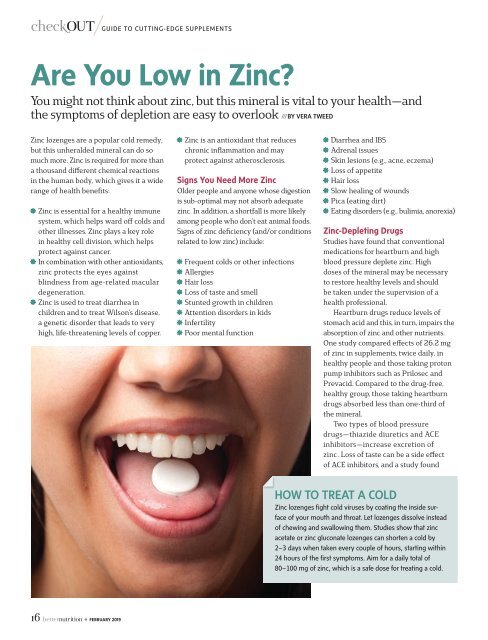Create successful ePaper yourself
Turn your PDF publications into a flip-book with our unique Google optimized e-Paper software.
checkOUT/GUIDE TO CUTTING-EDGE SUPPLEMENTS<br />
Are You Low in Zinc?<br />
You might not think about zinc, but this mineral is vital to your health—and<br />
the symptoms of depletion are easy to overlook /// BY VERA TWEED<br />
Zinc lozenges are a popular cold remedy,<br />
but this unheralded mineral can do so<br />
much more. Zinc is required for more than<br />
a thousand different chemical reactions<br />
in the human body, which gives it a wide<br />
range of health benefits:<br />
*<br />
*<br />
*<br />
Zinc is essential for a healthy immune<br />
system, which helps ward off colds and<br />
other illnesses. Zinc plays a key role<br />
in healthy cell division, which helps<br />
protect against cancer.<br />
In combination with other antioxidants,<br />
zinc protects the eyes against<br />
blindness from age-related macular<br />
degeneration.<br />
Zinc is used to treat diarrhea in<br />
children and to treat Wilson’s disease,<br />
a genetic disorder that leads to very<br />
high, life-threatening levels of copper.<br />
* Zinc is an antioxidant that reduces *<br />
chronic inflammation and may *<br />
protect against atherosclerosis. *<br />
*<br />
Signs You Need More Zinc *<br />
Older people and anyone whose digestion *<br />
is sub-optimal may not absorb adequate *<br />
zinc. In addition, a shortfall is more likely *<br />
among people who don’t eat animal foods.<br />
Signs of zinc deficiency (and/or conditions<br />
related to low zinc) include:<br />
* Frequent colds or other infections<br />
* Allergies<br />
* Hair loss<br />
* Loss of taste and smell<br />
* Stunted growth in children<br />
* Attention disorders in kids<br />
* Infertility<br />
* Poor mental function<br />
Diarrhea and IBS<br />
Adrenal issues<br />
Skin lesions (e.g., acne, eczema)<br />
Loss of appetite<br />
Hair loss<br />
Slow healing of wounds<br />
Pica (eating dirt)<br />
Eating disorders (e.g., bulimia, anorexia)<br />
Zinc-Depleting Drugs<br />
Studies have found that conventional<br />
medications for heartburn and high<br />
blood pressure deplete zinc. High<br />
doses of the mineral may be necessary<br />
to restore healthy levels and should<br />
be taken under the supervision of a<br />
health professional.<br />
Heartburn drugs reduce levels of<br />
stomach acid and this, in turn, impairs the<br />
absorption of zinc and other nutrients.<br />
One study compared effects of 26.2 mg<br />
of zinc in supplements, twice daily, in<br />
healthy people and those taking proton<br />
pump inhibitors such as Prilosec and<br />
Prevacid. Compared to the drug-free,<br />
healthy group, those taking heartburn<br />
drugs absorbed less than one-third of<br />
the mineral.<br />
Two types of blood pressure<br />
drugs—thiazide diuretics and ACE<br />
inhibitors—increase excretion of<br />
zinc. Loss of taste can be a side effect<br />
of ACE inhibitors, and a study found<br />
HOW TO TREAT A COLD<br />
Zinc lozenges fight cold viruses by coating the inside surface<br />
of your mouth and throat. Let lozenges dissolve instead<br />
of chewing and swallowing them. Studies show that zinc<br />
acetate or zinc gluconate lozenges can shorten a cold by<br />
2–3 days when taken every couple of hours, starting within<br />
24 hours of the first symptoms. Aim for a daily total of<br />
80–100 mg of zinc, which is a safe dose for treating a cold.<br />
16 • FEBRUARY <strong>2019</strong>

















